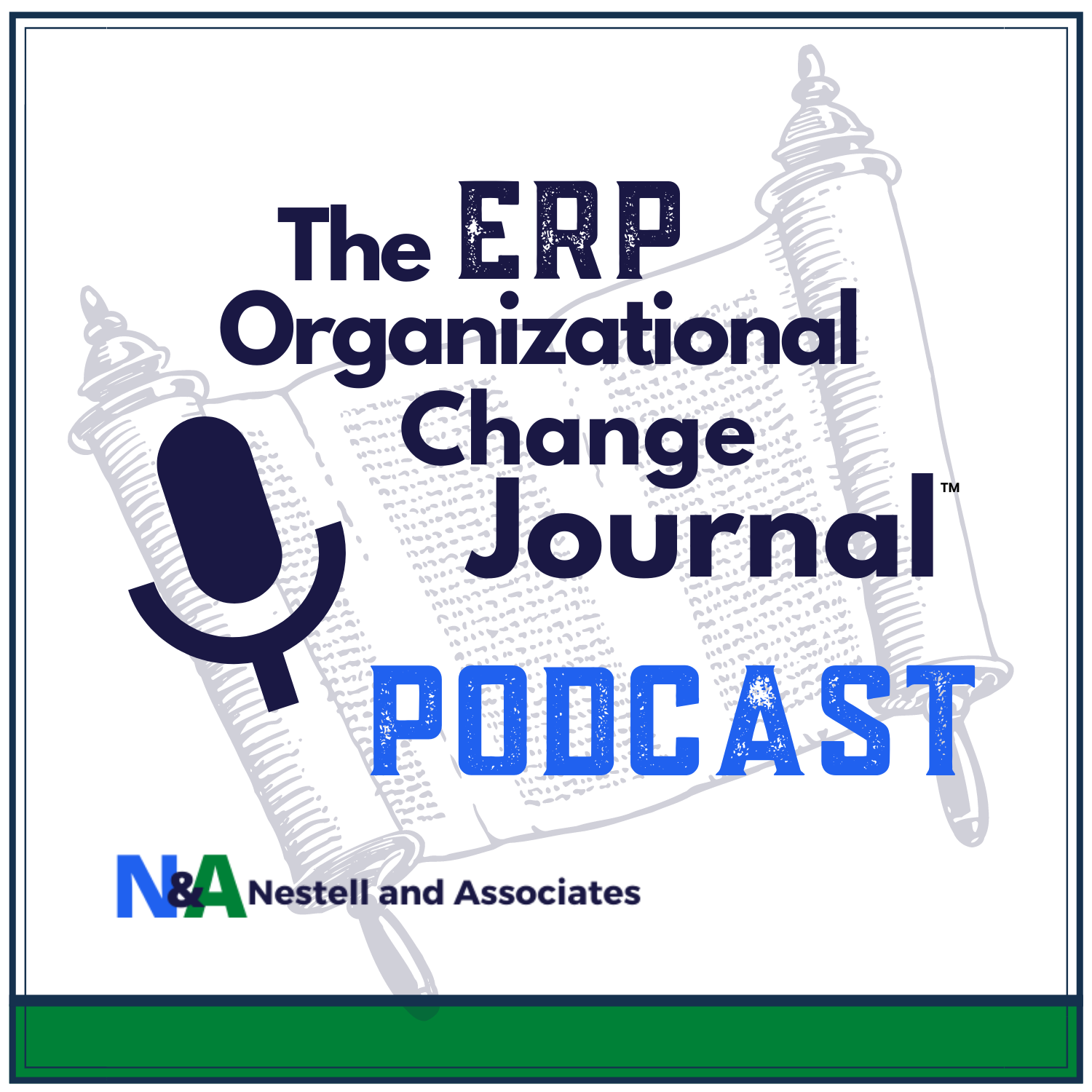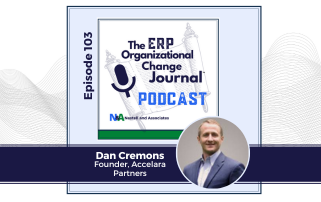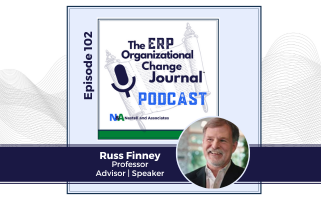About this Episode
In this episode, “ERP Organizational Change and Stakeholder Dynamics” with Samantha Jung-Fielding we intend to, in Samantha’s words, “share some behavioral sunshine in the world of ERP and digital transformation!”
During an ERP organizational change effort, the value and management of stakeholder dynamics and team diversity is critical. We do know that stakeholder dynamics, stakeholder knowledge, organizational culture influence, individual and team behaviors, emotions, simply “being human”, and stakeholder motivation have a significant impact upon ERP organizational change efforts.
So let’s learn more. Let’s explore these ideas further with Samantha.
Stream this Episode Here and Subscribe on all Major Platforms
We want this podcast to be the most useful podcast you listen to. And we need your help! Please leave us a podcast review!
Samantha Jung-Fielding
Samantha Jung-Fielding is an award-winning speaker, author and thought leader, specialising in behavioural alignment, people dynamics and work culture. She teaches emotional communication skills, trains virtual teams on effective engagement and mentors organisational leaders in peak performance enhancement.
More about Sam
Sam’s career began in the corporate world, where she spent 15 years in sales and marketing for international organisations. Seventeen years ago, she retrained in behavioural psychology, prompted by a lifelong obsession with what makes people tick!
Born in the UK, Sam and her husband migrated their family to New Zealand in 2012. They now live on a small alpaca farm in rural South Auckland.
Connect with Sam
- Website www.happinessence.co.nz
- Email address: sam@happinessence.co.nz
Podcast – Behavioral Alignment
More about this Episode
During an ERP organizational change effort, the Value and Management of stakeholder dynamics and Team Diversity (in its many forms) is critical.
During an ERP organizational change effort, the Value and Management of stakeholder dynamics and Team Diversity (in its many forms) is critical. In fact, the literature suggests that the value of teamwork and composition, organizational change, roles and responsibility, internal support, reluctance to change behavior, understanding stakeholder theory, tolerance for conflict, organizational culture, conflict management, effective stakeholder group communication, understating organizational stakeholder dynamics, and politics to name a few can all have a significant impact on ERP organizational change.
Organizations need team and individual dynamics and diversity due to its potential impact on organizational performance. Organizational team dynamics and diversity can result in positive or negative organizational performance outcomes. But real benefits exist for organizations if team dynamics and diversity is well understood and managed. Therefore, organizations need to understand how to manage team dynamics.
Effective leaders should be cognizant of organizational dynamics and how to manage in such a way that promotes organizational culture and performance.
“Motivational drivers make everything tick. Positive triggers create success, happiness and wellbeing via repetitive patterns and habits, practiced consistently over time. The simple act of uniting people inside an organization, business or team can rapidly magnify these results, significantly raising the bar. Because when the wrong mix is in place, a twisted culture emerges. Operating principles show bias. Policies and procedures bend towards less wholesome practices. Personalities clash, resulting in unruly emotions and undesirable displays of public misbehaviour. Over time, productivity stagnates, vision fades, and results track down.”
-Samantha Jung-Fielding
Episode Mentions
Dweck, C. S. (2008). Mindset: The new psychology of success. Random House Digital, Inc..; https://www.amazon.com/Mindset-Psychology-Carol-S-Dweck/dp/0345472322
Kahneman, D. (2011). Thinking, fast and slow. Macmillan.: https://us.macmillan.com/books/9780374533557/thinkingfastandslow
Episode Highlights: ERP Organizational Change and Stakeholder Dynamics
03:03 You state on your website that “every group (organization, business, team) develops member dynamics, management challenges invariably focus on the interactions between people. Yet the definition of leadership means issues center on a leader’s energy, style, or approach. In essence, for a macrocosm to progress further, the microcosm (or leader) must first evolve higher.” First, how would you define effective leadership? And how does an organization do this (evolve higher)? That’s a big question, but what would the general framework look like?
05:15 So, is leadership a skill or a trait?
06:10 Is it possible that successful leaders go through a confidence crisis, or maybe even an arrogance crisis, that prohibits or derails your answer to #1?
07:22 On your site, you discuss that “Which challenges are you facing? Every behavior can be modified…we have a solution for you!” And then you share some behavioral influences: Mindset, emotion, habit, energy, leadership, management, communication, relationship. So, let’s examine some of these further. We do know that for all stakeholders (even leaders) that large-scale ERP organizational change can be stressful, which means as an organization and as individuals there needs to be copying mechanisms and deliberate ways in which to minimize stress need to be deployed and considered. You share that “Every person operates at four levels (physical, emotional, mental, spiritual) and individual coping mechanisms go off-track for many reasons. When people unite inside an organization, business, or team, this creates a group dynamic that amplifies synergy…and highlights disconnection. Mindset, emotions, and behaviors may clash, synchronize or even loop together. The result can be counter-productive operating principles, irreconcilable communication issues and toxic culture challenges which are deeply frustrating for everyone.” What can you share in terms of human behavior and cultural paradigms in this context and in terms of mitigating stress?
18:20 When it comes to people management you share that “How does a standard interaction create harmony between some people, yet conflict for others? Implementing strategy, managing resources, and coordinating human effort (employees, volunteers) generates snags. Some disconnects improve with a process, others resolve via a policy or procedure…but for people dynamics, there is no quick fix.” How do you fix it?
24:24 You also share on your website that “Poor management decisions, project failure, dwindling team spirit, tardy communications, and deadline dodging are strong indicators of resource struggles.” You then list influences such as One bad apple, Power struggles, Productivity hitches, interpersonal conflict, delegation loopholes, and Collaborative breakdown. Please speak more to addressing the “one bad apple”.
29:05 What do you have to say about “COMMUNICATION” as a tool for aligning stakeholder dynamics? Most people, as you share “speak AND listen from their own subjective frame of reference, created by past experience and present understanding”. Any advice?
34:53 There are often many different stakeholder groups in an organization. Any “relationship” advice?
39:57 Samantha, we could go on for hours. But our last question… As fellow practitioners, we absolutely benefit from learning from our colleagues and friends, both “boots on the ground” as well as researchers. How would you summarize this conversation? That is if you had to distill your work into 3 or 4 sentences, what would you say to ERP organizational change practitioners?
More Related Episodes from TheERPocj & Blog Posts
Episode 47: Effective ERP Transformation, Mr. Ganapathy Iyer
Episode 45: Private Equity: Leading Through M&A and ERP Disruption, Dr. Constance Dierickx
Episode 39: The Smartest Person in the Room, Mr. Christian Espinosa
Episode 15: Effective Organizational Change, Dr. Eric Canny
Episode 9: Team Performance and Organizational Development, Dr. Timo Sandritter
The Crucial Role of Organizational Culture in ERP Implementation
Cultivating Success with a Positive ERP Organizational Culture
Latest Episodes
Human Capital in PE-Backed Companies: Strategies for Leadership and Talent Management
Human Capital in PE-Backed Companies: Strategies for Leadership and Talent ManagementEpisode Overview - PE-backed Human Capital Strategies Today’s episode centers on the pivotal role of human capital in PE-backed companies, emphasizing how strategic leadership and...
ERP Organizational Change: Technology Strategy
ERP Organizational Change: Technology Strategy and Keys to SuccessEpisode Overview - Technology Strategy In general, at the highest level of categorization, there seems to be consensus on the importance of people and culture, informational technology, and project...
AI and Private Equity Synergy: Fueling Business Transformation
AI and Private Equity Synergy: Fueling Business TransformationEpisode Overview - AI in PE Strategies In this episode, we explore how AI and Private Equity synergies are fueling business transformations and reshaping investment strategies and operational efficiencies....






0 Comments